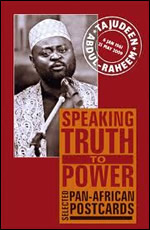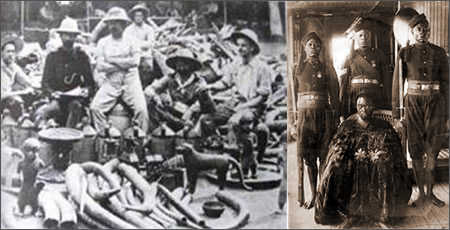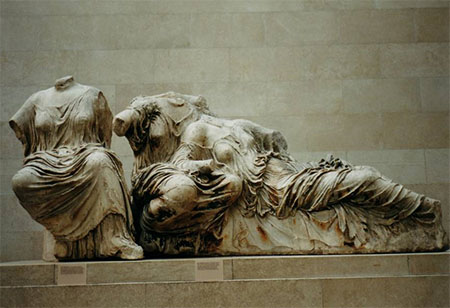Dr Tajudeen Abdul-Raheem’s untimely death on African Liberation Day 2009 stunned the Pan-African world. This selection of his Pan-African postcards, written between 2003 and 2009, demonstrates the brilliant wordsmith he was, his steadfast commitment to Pan-Africanism, and his determination to speak truth to power. He was a discerning analyst of developments in the global and Pan-African world and a vociferous believer in the potential of Africa and African people; he wrote his weekly postcards for over a decade. This book demonstrates Tajudeen Abdul-Raheem’s ability to express complex ideas in an engaging manner. The Pan-African philosophy on diverse but intersecting themes presented in this book offers a legacy of his political, social, and cultural thought.

For the past few months I have been starting each day reading one of Tajudeen Abdul-Raheems’ Pan African Postcards. Doing so has not only been deeply educational for me but also life affirming in a inspirational manner that I was not quite prepared for. Tajudeen is now an Ancestor after being tragically taken from us on African Liberation Day. His transition occurred following a car crash in Nairobi, Kenya on 25 May 2009. The first and only time I met and reasoned with him in person was during and following a debate in London entitled ‘A United States of Africa: Essential vision or misguided fantasy?’ before then we had only communicated though email.
For those of you who don’t know, Tajudeen Abayomi Amao Abdul-Raheem (Dr) is a giant in the Pan African world. His weekly Pan-African postcards were essential reading made available internationally through publications such as The Daily Trust, New Vision and Pambazuka news.
Tajudeen was willing and able to speak Truth with a rationality on topics that many held as politically taboo using evocative titles such as ‘The embarrassing grotesqueness of presidents’, ‘Don’t criminalise African languages’, ‘Current leaders are mass murderers’ and ‘Brown is wrong on Zimbabwe – but that does not make Mugabe right’.
This in many ways is where one of the strength of this book lies. Reading Tajudeens’ postcards often makes you feel like being the bcc recipient of personal correspondence that if sent to western media institutions such as the BBC would be immediately censored for daring to express an uncompromising Africentric stance on issues seen as ‘controversial’. Yet to characterise his work simply as provocative would be a crime. The powerful bite sized writing contained in titles like ‘What is in a name’ are not only educational but also entertaining making them immediately accessible and the classic definition of edutainment. In Tajudeens’ postcard entitled ‘Discussing the state of African universities’ he explains why it is essential to inject a substantive element of creativity in the thinking and activities of our educational processes in order to help better guide the energy of students looking to be agents of progressive social transformation. In ‘The demand for common citizenship’ Taju becomes very personal in what is one of his longest and most powerful pieces that eloquently makes the case for a common African citizenship that is impervious from attack by malignant agents of political, ethnic and/or economic discrimination.
This posthumously published book Speaking Truth to Power opens with various contributions from noted Pan Africanists. Indeed the words of Salim Ahmed Salim, Horace G Campbell, Ama Biney and Adebayo Olukoshi provide the first clue to those unfamiliar with Taju (the sobriety used by some of his family and friends) and his work. It is an elegant and expressive introduction that confers the correct respect owed to a tireless, passionate and ever humble Pan Africanist worker whose knowledge on African people, culture and politics was immense.
Taju never ‘sold out’ despite being courted and targeted by those in power. Indeed his commitment to eradicating poverty and empowering the people of Africa through initiatives such as the Millennium Development Goals (MDG) of which he was intimately involved shines throughout this work. A man of immense virtue and integrity he always made clear that it was the union of African people not African states or heads of states that secured his loyalty.
His advocacy of a ‘people-centred Pan Africanism’ gave clear focus to an expectation of true African freedom to include release from corruption, dictatorship and discrimination, not only from imperialists, but also from corrupt leaders in government and business – African and otherwise. In a postcard entitled ‘greed, pauperisation and the free market’ he calls for us to be our own liberators and reject invitations ridiculing us by encouraging us to provide endless talk about our problems whilst he exposes how in 2008 the American government approved the use of state funds to provide a $700 billion bailout for corrupt bankers, greed capitalists and private enterprises embedded in Wall Street. Socialism for the rich but not the poor he explained as he revealed how western nations had ‘failed’ to locate an annual $72 billion to deliver on the Millennium Development Goals by 2015.
In this superb collection of his legendary writings it quickly becomes clear why Tajudeen was rightly viewed and respected as a hero of African liberation not only by all those who knew him but also the enemies of Africa. He refused to compromise his ideals or seek only to engage in populist politics despite the promise of riches he could have easily obtained by quietly acquiescing to malignant power.
Throughout the book are examples of where he continued to boldly speak Truth to power on sensitive issues that affected all Africans. His ability to herald the positive actions of leaders such as Robert Mugabe, Meles Zenawi and even Mu’ammer Gadaffi whilst simultaneously pouring considered scorn on their failings without supporting the myopic interpretations delivered by western agents was unique in today’s world of moral compromise and centrist politrickering.
Tajudeen typically risked attack when he spoke out on issues that damaged the potency of imperialist driven policy just as he faced criticism when he challenged the stagnation of African leadership and the failure of the influential to stand up in order to help bring about positive change for the masses. Yet throughout his astute assertions, prophetic analysis and insightful critiques, he also ensured that alongside any critique he always provided potential and workable solutions. As such he could argue ‘Slavery was not dead’ and then inspire all Africans to come together and work to meet and go beyond the MDG’s. He was not one to tirelessly bemoan poor situations without working to enrich the lives of the impoverished with his actions. Indeed his famous slogan ‘Don’t Agonise! Organise!’ reflected both his world view and life decisions.
His principled stance was consistent irrespective of whether the topic was improving the mortality of mothers losing their lives during childbirth, advocating the need for term limits to be adopted by African leaders, challenging female oppression, promoting human rights or progressing Nkrumah’s vision for continental unity from ‘Cape Town to Cairo’ including unity with regions like the Caribbean and that where Africans are spread across the Diaspora.
Speaking Truth to Power also includes emotional and very personal topics such as ‘From now on I say: Not in my name’ where he shares his journey to give up smoking on the bequest of his children’s or even ‘Keep Walter Rodney alive’ where he supports the Rodney’s family call for justice from the Guyanese government for the assassination of Walter Rodney by the Forbes Burnham regime.
I was moved by this book because after just a few pages of reading I realised that as well as I thought I knew Africa, knew Pan Africanism, knew Truth - that I was still an infant seeking answers to problems already addressed by some of the greatest of our Ancestors. There is a weakness in that there is not much reflection on religion but that was Taju. His focus was always on the issue at hand and he skilfully navigated those areas that could cause disharmony or stagnation amongst us. As such, whilst the libratory writings left by many of our historical giants are still required core reading for all Africans, Tajudeens’ Speaking Truth To Power: Selected Pan-African Postcards rightfully claims the mantle as one of the only true and contemporary Pan African manuals for those interested in African liberation today but without pessimistic rhetorical sloganeering.
His last post card was about how ‘city beautification’ is destroying livelihoods’. It is an apt topic and wholly representative of his core support for Africa’s impoverished irrespective of trends in government policy. Taju was a great man and his family loss was our loss, Africa’s loss, and the world’s loss. Today he remains a beautiful spirit with a legacy that lives beyond his physical years in our midst. It is now for all of us to follow in his footsteps and fill the massive void that has been left by his transition. Ase.
A portion of the proceeds from sales of this book help contribute to the education of Tajudeens’ children and the Pan-African Education initiatives he helped establish. Please ensure a copy is stored in every library, university and school where African people reside.
Tajudeen Abdul-Raheem served as director for Africa of the United Nations’ Millennium Campaign and was responsible for establishing The Centre for Development and Democracy (CDD) and the Pan African Development Education and Advocacy Programme (PADAEP) in Uganda.

External Links
Pambazuka - Speaking Truth to Power: Honouring Tajudeen Abdul-RaheemAllAfrica - Speaking Truth to Power

Speaking Truth to Power: Selected Pan African Postcards by Tajudeen Abdul-Raheem
For those of you who don’t know, Tajudeen Abayomi Amao Abdul-Raheem (Dr) is a giant in the Pan African world. His weekly Pan-African postcards were essential reading made available internationally through publications such as The Daily Trust, New Vision and Pambazuka news.
Tajudeen was willing and able to speak Truth with a rationality on topics that many held as politically taboo using evocative titles such as ‘The embarrassing grotesqueness of presidents’, ‘Don’t criminalise African languages’, ‘Current leaders are mass murderers’ and ‘Brown is wrong on Zimbabwe – but that does not make Mugabe right’.
This in many ways is where one of the strength of this book lies. Reading Tajudeens’ postcards often makes you feel like being the bcc recipient of personal correspondence that if sent to western media institutions such as the BBC would be immediately censored for daring to express an uncompromising Africentric stance on issues seen as ‘controversial’. Yet to characterise his work simply as provocative would be a crime. The powerful bite sized writing contained in titles like ‘What is in a name’ are not only educational but also entertaining making them immediately accessible and the classic definition of edutainment. In Tajudeens’ postcard entitled ‘Discussing the state of African universities’ he explains why it is essential to inject a substantive element of creativity in the thinking and activities of our educational processes in order to help better guide the energy of students looking to be agents of progressive social transformation. In ‘The demand for common citizenship’ Taju becomes very personal in what is one of his longest and most powerful pieces that eloquently makes the case for a common African citizenship that is impervious from attack by malignant agents of political, ethnic and/or economic discrimination.
This posthumously published book Speaking Truth to Power opens with various contributions from noted Pan Africanists. Indeed the words of Salim Ahmed Salim, Horace G Campbell, Ama Biney and Adebayo Olukoshi provide the first clue to those unfamiliar with Taju (the sobriety used by some of his family and friends) and his work. It is an elegant and expressive introduction that confers the correct respect owed to a tireless, passionate and ever humble Pan Africanist worker whose knowledge on African people, culture and politics was immense.
Taju never ‘sold out’ despite being courted and targeted by those in power. Indeed his commitment to eradicating poverty and empowering the people of Africa through initiatives such as the Millennium Development Goals (MDG) of which he was intimately involved shines throughout this work. A man of immense virtue and integrity he always made clear that it was the union of African people not African states or heads of states that secured his loyalty.
His advocacy of a ‘people-centred Pan Africanism’ gave clear focus to an expectation of true African freedom to include release from corruption, dictatorship and discrimination, not only from imperialists, but also from corrupt leaders in government and business – African and otherwise. In a postcard entitled ‘greed, pauperisation and the free market’ he calls for us to be our own liberators and reject invitations ridiculing us by encouraging us to provide endless talk about our problems whilst he exposes how in 2008 the American government approved the use of state funds to provide a $700 billion bailout for corrupt bankers, greed capitalists and private enterprises embedded in Wall Street. Socialism for the rich but not the poor he explained as he revealed how western nations had ‘failed’ to locate an annual $72 billion to deliver on the Millennium Development Goals by 2015.
In this superb collection of his legendary writings it quickly becomes clear why Tajudeen was rightly viewed and respected as a hero of African liberation not only by all those who knew him but also the enemies of Africa. He refused to compromise his ideals or seek only to engage in populist politics despite the promise of riches he could have easily obtained by quietly acquiescing to malignant power.
Throughout the book are examples of where he continued to boldly speak Truth to power on sensitive issues that affected all Africans. His ability to herald the positive actions of leaders such as Robert Mugabe, Meles Zenawi and even Mu’ammer Gadaffi whilst simultaneously pouring considered scorn on their failings without supporting the myopic interpretations delivered by western agents was unique in today’s world of moral compromise and centrist politrickering.
Tajudeen typically risked attack when he spoke out on issues that damaged the potency of imperialist driven policy just as he faced criticism when he challenged the stagnation of African leadership and the failure of the influential to stand up in order to help bring about positive change for the masses. Yet throughout his astute assertions, prophetic analysis and insightful critiques, he also ensured that alongside any critique he always provided potential and workable solutions. As such he could argue ‘Slavery was not dead’ and then inspire all Africans to come together and work to meet and go beyond the MDG’s. He was not one to tirelessly bemoan poor situations without working to enrich the lives of the impoverished with his actions. Indeed his famous slogan ‘Don’t Agonise! Organise!’ reflected both his world view and life decisions.
His principled stance was consistent irrespective of whether the topic was improving the mortality of mothers losing their lives during childbirth, advocating the need for term limits to be adopted by African leaders, challenging female oppression, promoting human rights or progressing Nkrumah’s vision for continental unity from ‘Cape Town to Cairo’ including unity with regions like the Caribbean and that where Africans are spread across the Diaspora.
Speaking Truth to Power also includes emotional and very personal topics such as ‘From now on I say: Not in my name’ where he shares his journey to give up smoking on the bequest of his children’s or even ‘Keep Walter Rodney alive’ where he supports the Rodney’s family call for justice from the Guyanese government for the assassination of Walter Rodney by the Forbes Burnham regime.
I was moved by this book because after just a few pages of reading I realised that as well as I thought I knew Africa, knew Pan Africanism, knew Truth - that I was still an infant seeking answers to problems already addressed by some of the greatest of our Ancestors. There is a weakness in that there is not much reflection on religion but that was Taju. His focus was always on the issue at hand and he skilfully navigated those areas that could cause disharmony or stagnation amongst us. As such, whilst the libratory writings left by many of our historical giants are still required core reading for all Africans, Tajudeens’ Speaking Truth To Power: Selected Pan-African Postcards rightfully claims the mantle as one of the only true and contemporary Pan African manuals for those interested in African liberation today but without pessimistic rhetorical sloganeering.
His last post card was about how ‘city beautification’ is destroying livelihoods’. It is an apt topic and wholly representative of his core support for Africa’s impoverished irrespective of trends in government policy. Taju was a great man and his family loss was our loss, Africa’s loss, and the world’s loss. Today he remains a beautiful spirit with a legacy that lives beyond his physical years in our midst. It is now for all of us to follow in his footsteps and fill the massive void that has been left by his transition. Ase.
A portion of the proceeds from sales of this book help contribute to the education of Tajudeens’ children and the Pan-African Education initiatives he helped establish. Please ensure a copy is stored in every library, university and school where African people reside.
Tajudeen Abdul-Raheem served as director for Africa of the United Nations’ Millennium Campaign and was responsible for establishing The Centre for Development and Democracy (CDD) and the Pan African Development Education and Advocacy Programme (PADAEP) in Uganda.

External Links
Pambazuka - Speaking Truth to Power: Honouring Tajudeen Abdul-RaheemAllAfrica - Speaking Truth to Power
Ligali is not responsible for the content of third party sites





Get involved and help change our world